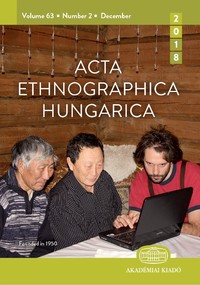Social Change, Dress and Identity
Social Change, Dress and Identity
Observations on the Disintegration of Peasant Culture as Exemplified by Rural Women’s Clothing in Hungary from the First World War to the End of the Kádár Era Socialism
Author(s): Ágnes FülemileSubject(s): Cultural Anthropology / Ethnology
Published by: Akadémiai Kiadó
Keywords: abandonment of folk costume; system of traditional clothing; urban dress; peasant culture; peasant identity; liminality; fashion; the role of personality; dress and identity; communist era;
Summary/Abstract: The article, based on extensive ethnographic fieldwork, studies the process of the disintegration of the traditional system of peasant costume in the 20th century in Hungary in the backdrop of its socio-historic context. There is a focused attention on the period during socialism from the late 1940s to the end of the Kádár era, also called Gulyás communism. In the examined period, the wearing and abandonment of folk costume in local peasant communities was primarily characteristic of women and an important part of women’s competence and decision-making. There was an age group that experienced the dichotomy of peasant heritage and the realities of socialist modernisation as a challenge in their own lifetime – which they considered a great watershed. The author interviewed both the last stewards of tradition who continued wearing costume for the rest of their lives and those who pioneered and implemented changes and abandoned peasant costume in favor of urban dress. The liminal period of change, the character and logic of the processes and motivations behind decision-making were still accessible in memory, and current dressing practices and the folklorism phenomena of the “afterlife” of costume could still be studied in real life. The study shows that costume was the focus point of women’s aspirations, attention, and life organization, and how the life paths of strong female personalities were articulated around clothing. It also reveals that there was a high level of self-awareness and strong emotional attachment in individual relationships to clothing in the rural context, similar to – or perhaps even exceeding – the fashion-conscious, individualized urban context. Examining the role of fashion, modernization, and individual decisions and attitudes in traditional clothing systems is an approach that bridges the mostly distinct study of folk costume and the problematics of dress and fashion history research.
Journal: Acta Ethnographica Hungarica
- Issue Year: 65/2020
- Issue No: 1
- Page Range: 107-186
- Page Count: 80
- Language: English

